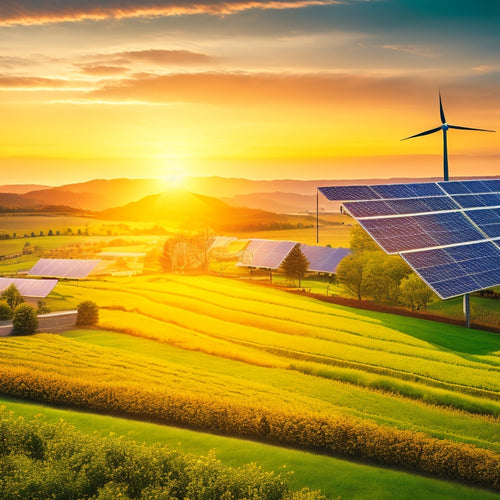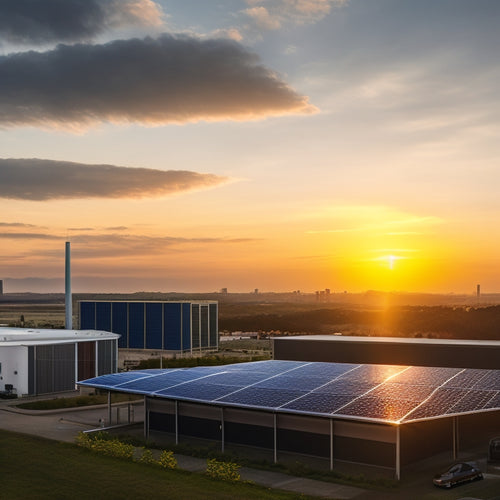
What Are the Best Solar Energy Cost Savings Strategies for Homeowners
Share
To maximize your solar energy savings, focus on energy efficiency and system performance. Start by upgrading insulation and using smart technology to cut consumption. Utilizing net metering can earn you credits for excess energy generated. Confirm your solar panels are properly oriented and regularly maintained to enhance durability and efficiency. Investing in high-quality components will increase energy production and reduce reliance on traditional sources. By understanding your energy needs and optimizing system size, you'll further improve savings. Keep looking for more effective strategies to solidify your financial freedom while contributing to a greener future.
At a Glance
- Invest in energy efficiency upgrades like insulation and smart technology to significantly lower long-term energy bills.
- Utilize net metering to earn credits for excess solar energy generated, reducing future utility costs.
- Take advantage of government incentives to offset initial solar system costs and enhance overall savings.
- Regularly maintain your solar system to ensure peak performance, extending its lifespan and maximizing energy production.
- Conduct an energy audit to understand consumption patterns, allowing for optimized solar system sizing and efficiency.
Lower Long-Term Energy Bills
By investing in energy efficiency improvements and taking advantage of net metering benefits, you can greatly lower your long-term energy bills.
Additionally, government incentives can help mitigate initial costs and enhance your savings.
These strategies not only reduce your overall consumption but also allow you to earn credits for any excess energy your system generates.
As a result, you're not just saving money; you're also contributing to a more sustainable future.
Energy Efficiency Improvements
Energy efficiency improvements can greatly lower your long-term energy bills, making them a smart investment for homeowners. By focusing on upgrades like insulation, you can markedly reduce the energy required to heat or cool your home.
Insulation upgrades not only keep your living space comfortable but also help you avoid wasting money on excessive energy use.
Incorporating smart technology is another effective strategy. Smart thermostats, for example, allow you to optimize your heating and cooling schedules based on your lifestyle, ensuring that you're not heating or cooling an empty home.
This level of control can lead to substantial savings on your monthly utility bills.
LED lighting and energy-efficient appliances also contribute to reducing your overall energy consumption. By choosing products that use less energy without sacrificing performance, you're embracing a more sustainable lifestyle that aligns with your desire for freedom and independence from high energy costs.
Ultimately, investing in energy efficiency improvements not only lowers your monthly bills but also enhances the overall value of your home.
It's a step toward financial freedom and a more sustainable future.
Net Metering Benefits
Investing in energy efficiency improvements sets the stage for reaping the rewards of net metering, which can considerably lower your long-term energy bills. By generating your own solar energy, you not only reduce dependence on traditional energy sources but also take advantage of net metering advantages. This system allows you to send excess electricity back to the grid, earning credits that offset future utility costs.
As your solar panels produce more energy than you consume, these credits accumulate, translating into substantial utility savings. You're not just lowering your monthly bills; you're also creating a buffer against rising energy prices. The more energy-efficient your home is, the more you can capitalize on these savings, maximizing your investment in solar.
Moreover, net metering enables you as a homeowner. It reinforces the idea that you can control your energy future, leading to greater financial freedom. With reduced reliance on your utility provider, you'll find yourself less susceptible to fluctuating rates.
Embracing net metering isn't just a financial decision; it's a step towards energy independence and sustainability, ensuring you save money while contributing to a cleaner planet.
Environmental Impact Reduction
By switching to solar energy, you considerably lower your carbon footprint, contributing to a healthier planet.
Implementing sustainable energy practices not only benefits the environment but also enhances your home's value.
Embracing these changes positions you as a responsible homeowner committed to a greener future.
Lower Carbon Footprint
Reducing your carbon footprint through solar energy adoption greatly improves your home's environmental sustainability. By utilizing renewable resources like sunlight, you're not just cutting down on electricity bills; you're actively contributing to a healthier planet.
Traditional energy sources, such as coal and natural gas, emit harmful greenhouse gases that contribute to climate change. In contrast, solar energy produces clean power with minimal environmental impact.
When you choose solar, you're also supporting the use of eco-friendly materials. Many solar panels are designed with sustainable components, ensuring that the entire lifecycle—from production to disposal—minimizes harm to the environment.
This commitment to eco-friendly practices connects with those who value freedom, as it enables you to take control of your energy consumption and its consequences.
Moreover, reducing your reliance on fossil fuels allows you to adopt a more sustainable lifestyle. Not only are you making a positive impact on your local ecosystem, but you're also setting an example for your community.
Opting for solar energy is more than just a financial decision; it's a bold step toward a cleaner, greener future for everyone.
Sustainable Energy Practices
Embracing sustainable energy practices not only enhances your home's efficiency but also greatly lessens environmental impact. By integrating renewable energy sources, like solar panels, you can greatly reduce your reliance on fossil fuels. This change not only lowers your energy bills but also contributes to a cleaner planet.
Plus, many states offer renewable incentives to encourage homeowners to make this shift, making it financially attractive.
Participating in community programs that promote sustainable practices can also amplify your impact. These programs often provide resources, workshops, and financial aid to help you implement eco-friendly solutions.
Engaging with your neighbors in these initiatives nurtures a sense of community while spreading awareness about the benefits of sustainable living.
You've got the power to create a healthier environment and save money simultaneously. By adopting sustainable energy practices, you're not just investing in your home; you're investing in the future of your community and the planet.
System Efficiency and Durability
To truly maximize your solar energy production, you need to focus on both system efficiency and durability.
Choosing high-quality components such as lithium-ion batteries and investing in regular maintenance can greatly extend the life of your system while ensuring peak performance.
Maximizing Energy Production
When it comes to maximizing energy production from your solar energy system, understanding both efficiency and durability is crucial.
Start by considering your solar panel orientation; a south-facing installation typically yields the highest energy output. Conduct a shading analysis to identify potential obstacles that could block sunlight, reducing efficiency. Opt for advanced inverter technology to convert solar energy into usable electricity effectively, guaranteeing you're utilizing every ray.
Explore photovoltaic advancements that can improve your system's performance, and consider solar tracking systems that follow the sun's path for increased energy yield optimization.
Assess your roof suitability before installation; the angle and material can considerably impact energy production. Pair your system with energy storage solutions to capture excess energy for use during non-sunny hours, maximizing your investment.
Keep an eye on installation costs and factor in available tax incentives that can offset your expenses.
By strategically implementing these elements, you'll not only improve your energy production but also secure your freedom from rising electricity costs, enabling you to take control of your energy future.
Adopt these strategies to guarantee your solar system is as efficient and durable as possible.
Long-Term System Maintenance
Maintaining your solar energy system is key to guaranteeing its efficiency and durability over the long haul. To reap the full benefits of your investment, regular system inspections are vital. These assessments help you identify any potential issues early, preventing costly repairs down the line. When you catch problems before they escalate, you not only save money but also make sure your system operates at peak performance.
Preventative maintenance is another critical aspect of long-term care. By cleaning your solar panels and checking connections regularly, you can boost energy production and extend the lifespan of your system. Think of it as giving your solar setup the attention it deserves—just like any other important asset.
Moreover, a well-maintained solar system can greatly reduce your energy bills, allowing you to enjoy greater financial freedom. By committing to these maintenance practices, you're not just protecting your investment; you're also equipping yourself to utilize sustainable energy without interruptions.
Selecting Based on Energy Needs
To make the most of your solar investment, you need to assess your energy consumption patterns.
Understanding how much energy you use will help you evaluate the appropriate system size for your home. Conducting an energy needs assessment can provide observations into your lifestyle and peak usage times.
Assessing Energy Consumption Patterns
Understanding your energy consumption patterns is essential for selecting the right solar energy system for your home. Start with an energy audit to identify your usage trends and peak consumption times. This gives you a clear illustration of when and how you use energy, helping you make informed decisions.
Monitor your energy consumption closely. Use energy monitoring tools to track your usage daily and seasonally, revealing patterns that can guide your system choice. Consider seasonal variations in energy needs—your system should accommodate both summer cooling and winter heating demands.
Behavioral changes can also impact your energy consumption. Small adjustments, like using more energy-efficient appliances, can reduce your overall needs, which means you won't have to invest in as large a solar system.
Utilize data analysis for consumption forecasting, allowing you to predict future usage based on historical data. With these observations, you can implement optimization strategies that align your solar energy system with your specific needs.
Ultimately, understanding your energy consumption will enable you to choose a solar solution that maximizes savings, gives you freedom from rising energy costs, and enhances your lifestyle.
Evaluating System Size Requirements
Evaluating your system size requirements is essential for ensuring that your solar energy setup meets your specific energy needs without overspending.
Start with an energy generation assessment to understand your average energy consumption. By analyzing your electricity bills, you can identify patterns and peak usage times, which will guide your solar panel sizing decisions.
Next, consider your location and available sunlight, as these factors greatly impact energy generation potential. A well-sized solar system should cover your energy needs while accounting for seasonal variations in sunlight.
If you find that your current energy demands exceed what a solar system can provide, it may be time to reevaluate your consumption habits or consider a larger system.
Lower Maintenance Requirements
When you invest in solar energy, you'll appreciate the minimal upkeep required to keep your system running efficiently.
Unlike traditional energy sources, solar panels are designed to be durable and need little more than occasional cleaning and inspection.
This means you can save both time and money on maintenance, allowing you to focus on enjoying the benefits of renewable energy.
Minimal Upkeep Needed
Embracing solar energy not only slashes your utility bills but also comes with minimal upkeep requirements. Once you install solar panels, you can enjoy the freedom from constant maintenance and repairs.
Solar panel longevity is impressive; most panels are designed to last 25 years or more with minimal intervention. This means fewer worries about breakdowns and repairs, freeing you to focus on what truly matters.
While you'll want to schedule routine inspections to verify everything's running smoothly, these are typically infrequent and straightforward. A quick check-up once or twice a year is usually sufficient, allowing you to maintain peak performance without significant time investment.
Most homeowners find that cleaning the panels occasionally—just to remove dust or debris—will keep them operating efficiently.
Frequently Asked Questions
What Financing Options Are Available for Solar Energy Systems?
When considering financing options for solar energy systems, you've got choices like solar loans or leasing options. Each method offers unique benefits, helping you achieve energy independence while managing upfront costs effectively. Investigate what suits you best!
How Do Solar Tax Credits Work for Homeowners?
Isn't it ironic how tax credits can feel like free money? When you invest in solar, you can qualify for federal incentives, reducing costs considerably. Just verify you meet tax credit eligibility for maximum savings.
Can I Install Solar Panels Myself?
You can install solar panels yourself, but DIY solar projects require careful planning and knowledge. Weigh the potential savings against the risks of improper installation, as safety and efficiency are vital for successful solar panel installation.
What Are the Local Regulations for Solar Panel Installation?
Before diving into solar, you'll wanna check local regulations. Understand the permitting process and installation guidelines. Knowing these rules guarantees you can freely utilize solar energy without facing unexpected obstacles down the road.
How Does Solar Energy Affect Home Resale Value?
Solar energy can greatly enhance your home's resale value. With rising solar market trends and increased property value enhancements, potential buyers often see solar systems as desirable features, making your home more appealing and competitive in the market.
Explore More
By utilizing solar energy, you're not just cutting long-term energy bills; you're planting seeds for a sustainable future. Each panel on your roof is a step toward slashing your carbon footprint and embracing energy independence. When you choose wisely based on your energy needs and prioritize system efficiency, you're ensuring your investment pays off for years to come. So, take the leap into solar—it's not just a choice; it's a powerful statement for a greener planet.
Related Posts
-

Net Metering in Renewable Energy's Future
Net metering's future is vital for driving renewable energy growth and financial savings. You can reduce your electri...
-

Top Camping Water Bottles for Adventure
When you're out adventuring, picking the right camping water bottle is essential for staying hydrated. Look for durab...
-

Advantages of Commercial Solar Battery On-Site Storage
By investing in a commercial solar battery on-site storage system, you can greatly reduce your energy grid dependence...


